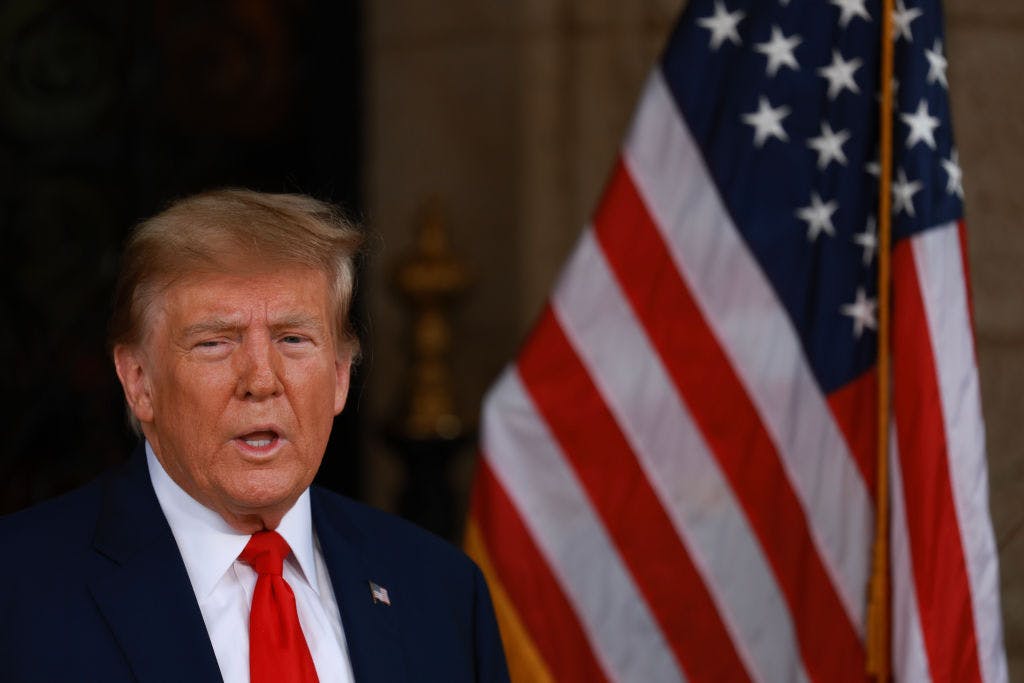Unanimous Court Hands Trump ‘Big Win’ on Disqualification; Foe of 45th President Cries ‘Disgraceful’
In a watershed constitutional moment, the Nine rule that states cannot disqualify candidates for federal office as insurrectionists.

The Supreme Court’s ruling that Colorado erred in barring President Trump from the presidential ballot is a landmark constitutional moment that ends, at least for now, the years-long effort to use the 14th Amendment to shape — or distort — the 2024 election.
In a statement, the legal director, Ron Fein, of one of the legal groups, Free Speech for People, pushing for disqualification of Mr. Trump, called the court’s decision “disgraceful” and “dangerous.” He accused the Supreme Court of having “made a mockery” of the Constitution. Mr. Trump took to Truth Social to call the ruling a “BIG WIN FOR AMERICA!!!”
The decision was per curiam, meaning that it was written by the court as a whole rather than any single justice. That suggests a level of unanimity in respect of the outcome, though the court’s liberal wing — Justices Elena Kagan, Ketanji Brown Jackson, and Sonia Sotomayor — registered a separate concurrence.
Even the liberals, though, allowed that barring Mr. Trump as an insurrectionist on the basis of Section Three of the 14th Amendment would “create a chaotic state-by-state patchwork, at odds with our nation’s federalism principles.” All the justices agreed that the “Constitution makes Congress, rather than the States, responsible for enforcing” disqualification against federal officials.
The crux of the court’s ruling is that “States may disqualify persons holding or attempting to hold state office. But States have no power under the Constitution to enforce Section 3 with respect to federal offices, especially the Presidency.” This means that it is Congress that must act, not a state supreme court, as in Colorado, or a state’s secretary of state, as in Maine.
The Nine reckon that federal officials — from the president on down — “owe their existence and functions to the united voice of the whole, not of a portion, of the people,” and thus cannot be disqualified by any one of the states. The justices see in the Framers’ design a solicitude to federal prerogative, noting that state actors are prohibited from issuing writs of mandamus against federal officials and from granting habeas corpus relief to federal prisoners.
Turning to history, the court reports that it has not “identified any tradition of state enforcement of Section 3 against federal officeholders or candidates in the years following ratification of the Fourteenth Amendment.” This was the crucial interlude after the Civil War — Reconstruction — that one scholar, Eric Foner, calls America’s “Second Founding.” The jurists call this “lack of historical precedent” a “severe constitutional problem.”
The high court appears particularly worried about granting states the power to disqualify a presidential candidate. They cite a prior court’s position that allowing state sway over presidential eligibility would “sever the direct link that the Framers found so critical between the National Government and the people of the United States” and replace it with an “evolving electoral map.”
“Nothing in the Constitution,” the justices write, “requires that we endure such chaos” as would be precipitated by state disqualification of a presidential candidate. “All nine Members of the Court agree,” the opinion declares, that Mr. Trump must be on the ballot in Colorado, and everywhere else.
Justice Amy Coney Barrett, though, filed a concurrence agreeing with the ruling and noting that the court has “settled a politically charged issue in the volatile season of a Presidential election.” Addressing the volatilities of the moment unflinchingly, she reflected that “particularly in this circumstance, writings on the Court should turn the national temperature down, not up.” She ventured that the “message Americans should take home” is that “All nine Justices agree on the outcome of this case.”
The liberals, in a concurrence striated with ambiguity, agree with the outcome but castigate their colleagues for the breadth of the ruling that “disqualification for insurrection can occur only when Congress enacts a particular kind of legislation pursuant to Section 5 of the Fourteenth Amendment.” They would prefer to keep doors open to “other potential means of federal enforcement.”
The liberals’ anger at the scope of the ruling — legislation will now be necessary to disqualify a federal candidate — reaches its highest pitch in the accusation that the court has insulated “all alleged insurrectionists from future challenges to their holding federal office.” The justices did not rule on whether an insurrection occurred, or whether the president is an “officer of the United States.” Colorado answered both questions in the affirmative.
The concurrence appears to have in mind one particular means of federal action that is non-congressional — “judicial enforcement of that provision, such as might occur when a party is prosecuted by an insurrectionist and raises a defense on that score.” No federal court has ruled that an insurrection occurred, or that Mr. Trump “engaged” in it as mandated by the 14th Amendment.
Not one of the more than 1,000 defendants charged with crimes with respect to January 6, 2021, has been charged with insurrection. Mr. Trump, at impeachment, was acquitted of that charge by the Senate.

